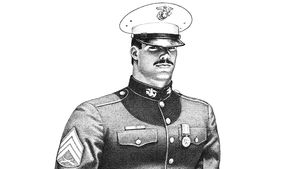The movement to
gain equal rights for gay men, lesbian, bisexuals, and
transgender people in this country has slowed to a crawl. In
part it's been slowed by the effectiveness of
our opponents in framing the issues to our
disadvantage, but it's also hampered by our own lack
of vision in developing strategies relevant to current
times.
Occasional
progress is noted, and appreciated: a watered-down hate
crimes bill in one state; the formation of a
gay-straight alliance at a high school in another. But
a reality check shows us that in "Middle
America"--that hallowed spot of ground in
Kansas that the media claims represents all of
conservative America (or red-state America)--antigay
measures have a much greater chance of passing in state
legislatures and local councils than do their
pro-equality counterparts. To see this, one need only
look at the number of anti-marriage amendments being
proposed and passed across the nation compared with
the number of states recognizing marriage equality or
civil unions.
Culturally GLBT
themes can be winners. The eight-year run of Will
& Grace, the buzz about GLBT-themed movies
during the recent awards season, and the musical
contributions of country music icons Willie Nelson,
Dolly Parton, and Emmylou Harris all show that GLBT
acceptance in the country is increasing. Despite what
right-wing pundits are saying and CNN is reporting,
even in Middle America, Brokeback Mountain was
a success, having played to packed movie houses of gays
and straights and heterosexual couples and gray-haired
ladies.
As I write this
Brokeback is still in play even here in
Birmingham, Ala., after showing for several weeks. I am sure
that the local theaters, in business to make money,
would not hold this or any other movie over week after
week if people were not continuing to go see it. Dolly
Parton, a longtime vocal supporter of the GLBT community,
performed at a sold-out concert here recently. The fact that
a heart-wrenching love story involves two men or that
a country music legend supports our community is OK in
Middle America.
So what does it
mean that cultural phenomena, with capitalist roots to
say the least, can have a greater effect in promoting
equality than political advocacy? For the leaders of
GLBT advocacy groups it means they need to rethink
their strategies.
It is time for a
paradigm shift in the way the fight for equality is
approached. For years these groups have concentrated their
efforts in obtaining certain rights in progressive,
blue states, where they say they have the best chance
of getting legislation passed or victories in the
courts. While every pro-equality bill that passes is
appreciated, it is time to rethink that approach.
Prior to
Lawrence v. Texas--the Supreme Court case
that overturned the Texas sodomy law and thus made the
remaining sodomy laws across the country
invalid--this was a good strategy, because the antigay
groups could always use the argument that same-sex
activity was illegal to win court cases or defeat
legislation. That being the case, it would have been
useless, and a waste of valuable resources, to bring the
fight for equal rights to the red states. But once
same-sex relationships were declared legal, this no
longer made sense.
Here in the
South, in Birmingham, Ala., every year during the month of
February we celebrate Black History Month, and every year I
learn a little more about the events that shaped this
city's (and nation's) history and the
people who made it happen. One of them was Coretta Scott
King, whom we recently lost--not only a great civil
rights leader but a strong supporter of GLBT rights in
the black community. Many in the African-American
community see no similarity in the civil rights movement
and the current gay rights movement. But Martin Luther King
Jr. himself said, "Injustice anywhere is a
threat to justice everywhere," and his widow
used this quote often in her fight for GLBT rights.
But it is not
whether the two movements are similar or dissimilar that is
important. Rather, the civil rights successes of the
'60s are what we should be focusing on to
develop our own strategies for the 21st century.
During the 1950s and '60s, civil rights leaders
realized the importance of bringing the fight for
equality to the places where the inequality was the
greatest: Cities like Birmingham, Selma, and Little
Rock; states like Mississippi and South Carolina,
where the ideals of equal treatment for blacks were at
great odds with the beliefs of the political leaders
and the conservative populace.
The important
part of this is that money and workers came to the Southern
states from elsewhere. They came in the form of Freedom
Riders and others, many of whom were white and/or
Jewish and from the more wealthy Northern states where
blacks were already being treated with greater
equality. They took time away from their work, their
education, their families, and risked their very lives
(and in some cases lost them) to assist in the fight
for civil rights.
The lesson to be
learned can be summed up in two words: It worked.
The same strategy
could work for the GLBT fight for equality as well.
This does not mean we should stop the work being done in the
blue states where GLBT persons enjoy greater
acceptance already, but it does mean that the focus
should be shifted to the states where we have the most to
gain, rather than the states that put up the least
resistance.
Suggestions:
Provide more assistance in getting progressive candidates
elected. Hold meetings and conferences and events in
Arkansas or Alabama rather than in California or New
York. When you bring an event to the South,
don't hold it in Atlanta or Fort Lauderdale; instead
go to Jackson, Miss., or Charleston, S.C., for
example. Then encourage those attending to travel to
these places and tell them the importance of doing so
and of making their presence known when they do. It is no
more difficult to travel to a midsize city in the
South than it is to travel to New York City or
Chicago, and once there, hey, gays make the party
anyway, so lack of entertainment is not excuse.
By doing this,
several things will occur. Conservatives will see that the
progressive movement for GLBT equality is truly a national
movement that is not afraid to bring its people to
events and communities in Middle America. GLBT people
living in red Southern states will realize that
advocacy groups care about them and will include them in the
fight, rather than just receiving pleas for money (to
be spent elsewhere) in the mail every few weeks.
Middle America will learn that GLBT people are not a
threat--not to marriage, not to children, not to
family values, and not to religion.
In addition, GLBT
visitors and straight allies who come with them
(21st-century freedom fighters) will learn that the South
and Midwest are not full of hateful, bigoted, backward
hillbillies and rednecks (as we are often called by
"coastal" gays)--rather, friendly folks
of which the straights need to be educated and the
gays need encouragement. In this regard the
"Southophobia" demonstrated by so many East
Coast and West Coast gays will diminish, and our own
community will become more inclusive and more united.
What I'm
proposing is indeed a paradigm shift in the way the equal
rights movement is carried out. Such changes will
require lots of thought and study. I am not a leader
in any GLBT organization, and this suggestion comes
from no one but myself. I know that for more than a decade
we here in Birmingham and elsewhere in Middle America
have screamed at times for help and have been expected
to be satisfied with an occasional visit from a
director or a promise that progress is being made
(elsewhere).
To the leaders of
our major GLBT organizations, I say: You are the ones
who can do this. You who have the resources and the manpower
and womanpower, who can plan strategies that will be
inclusive of the whole country, and who can bring the
fight for equality to the places where inequality is
greatest. It worked for the Freedom Riders and the
"northern liberals" (as they were called) who
helped bring voting rights and desegregation to the
South, and at the same time, civil rights across the
county.
To honor the
legacy of Coretta Scott King, the same strategies should be
used to gain equal rights for the GLBT community.


















































































